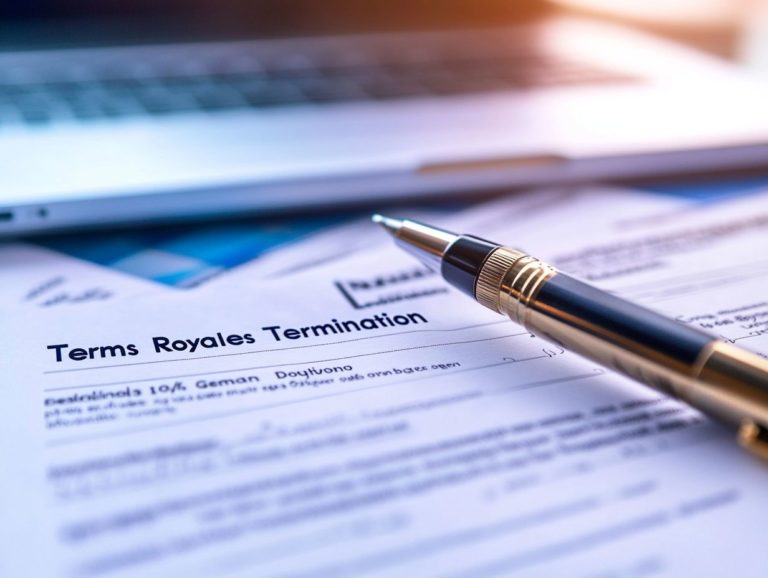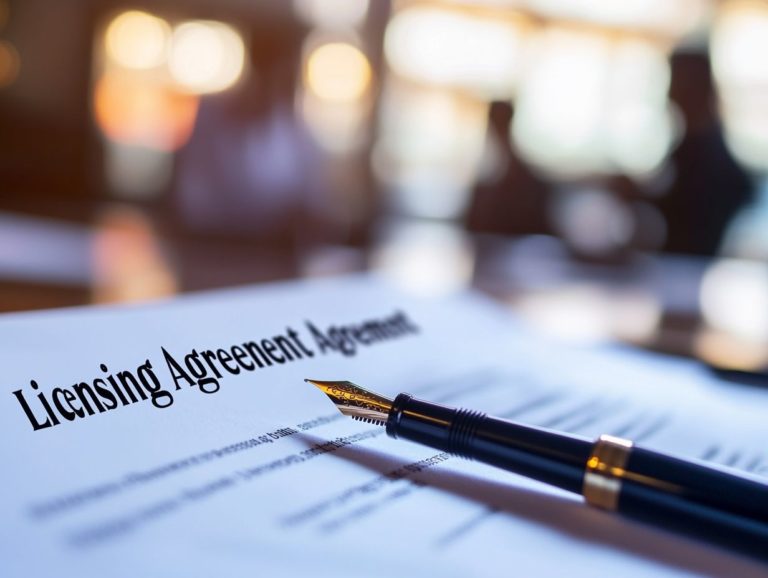How to Evaluate a Licensing Agreement Proposal
Licensing agreements are pivotal in the business landscape. They allow you to harness intellectual property while safeguarding your interests.
Grasping the intricacies of these agreements is essential for anyone seeking to navigate the complexities of partnerships and collaborations.
This article unpacks the core elements of licensing agreements. It covers everything from their definitions and purposes to the critical considerations when evaluating proposals.
You will also find valuable insights on negotiation strategies and finalization steps. This equips you with the tools necessary to make informed decisions.
Jump in! Discover how to assess and manage licensing agreements for your business success.
Contents
- Key Takeaways:
- Understanding Licensing Agreements
- Key Elements of a Licensing Agreement
- Factors to Consider when Evaluating a Licensing Agreement Proposal
- Negotiating and Finalizing the Agreement
- Frequently Asked Questions
- What is a licensing agreement proposal?
- How do I evaluate a licensing agreement proposal?
- What should I look for in a licensing agreement proposal?
- How can I determine if a licensing agreement proposal is fair?
- What are some common pitfalls to watch out for when evaluating a licensing agreement proposal?
- Can I negotiate the terms of a licensing agreement proposal?
Key Takeaways:

Understand the purpose and key elements of a licensing agreement to evaluate proposals effectively. Consider factors such as scope of rights, financial terms, duration, termination clauses, quality control, and marketing plans. To enhance your strategy, explore how to negotiate a licensing agreement using valuable tips and follow key steps to finalize the agreement successfully.
Understanding Licensing Agreements
Understanding licensing agreements is vital when commercializing technology. These legal documents define the terms under which a Licensor grants a Licensee the rights to utilize specific intellectual property.
This understanding is not merely advantageous; it is crucial for both parties to realize their business objectives while adhering to existing laws. It also paves the way for fruitful partnerships that can enhance revenue generation and elevate brand strategies.
Definition and Purpose
A licensing agreement is a legal document that allows you, the Licensee, to use the Licensor’s intellectual property in exchange for compensation, which may include royalties, fees, or revenue sharing.
This arrangement creates a vital link between the creator and the user. It establishes clear terms that protect the original owner’s rights while allowing you to leverage valuable assets.
By entering into this agreement, both you and the Licensor can benefit. The Licensor generates a consistent revenue stream through royalties and fees, ensuring their intellectual property is effectively monetized.
As the Licensee, you gain access to established intellectual property. This enhances your product offerings and significantly reduces the time and costs typically associated with developing proprietary content from scratch.
Such agreements foster innovation and promote collaboration across various sectors.
Key Elements of a Licensing Agreement
Key elements of a licensing agreement encompass essential terms and conditions that shape the relationship between the Licensor and the Licensee. These include critical aspects like termination clauses, performance warranties, compensation structures, and the rights to audit compliance.
Understanding these elements is vital for navigating the complexities of the agreement effectively.
Important Terms and Conditions
Important terms and conditions in licensing agreements are essential for defining the expectations and obligations of both Licensors and Licensees.
This includes elements such as governing law, risk management strategies, and specific performance metrics.
Navigating these agreements requires a comprehensive understanding of the implications tied to these critical elements.
Governing law tells you which jurisdiction interprets the agreement and resolves disputes. Be confident in the legal framework that guides your interactions.
Implementing robust risk management strategies minimizes potential liabilities and safeguards against unforeseen circumstances that could threaten the partnership.
Establishing clear performance metrics ensures accountability and aligns your objectives with those of the other party. This fosters a collaborative environment conducive to achieving mutually beneficial outcomes.
Factors to Consider when Evaluating a Licensing Agreement Proposal

When you re evaluating a licensing agreement proposal, it s crucial to weigh several key factors.
Consider the financial terms carefully. Assess the marketability of the product and examine the user’s capacity to fulfill the minimum order quantity and other contractual obligations.
Each aspect plays a significant role in determining the overall viability of the agreement.
Scope of Rights and Restrictions
The rights and restrictions in a licensing agreement define the specific rights you have to use the product. It also includes any limitations set by the owner.
By clearly outlining these elements, you can navigate your responsibilities with greater ease. This significantly reduces the likelihood of misunderstandings or disputes.
This structure fosters a harmonious business relationship and encourages innovation. You can explore the full potential of the licensed materials within the agreed parameters.
Establishing these guidelines is crucial for maintaining accountability and promoting transparency throughout the duration of the agreement.
Financial Terms and Royalties
Now, let s dive into the financial aspects that drive your agreement. Financial terms define how you, as the user, compensate the owner.
This includes options for revenue sharing and audit rights to ensure transparency.
These agreements frequently outline diverse compensation methods, such as upfront fees, milestone payments, and ongoing royalties. You might encounter a fixed percentage of sales or a tiered structure designed to reward higher performance.
As the user, you may be granted specific rights to audit the owner’s financial records. This ensures compliance with the established royalty framework.
Understanding advance payments, minimum guarantee clauses, and the implications of territory restrictions is essential for both parties involved. This deep understanding fosters a mutually beneficial relationship while safeguarding rights to use the product.
Duration and Termination Clauses
Duration and termination clauses in licensing agreements delineate the length of the contract and the conditions under which either party may terminate the agreement.
These clauses form the bedrock of the relationship between the parties. They ensure that you have a clear understanding of your rights and responsibilities throughout the life of the agreement.
For the owner, defining these terms safeguards intellectual property and helps assess the potential revenue stream from the asset. Conversely, as the user, it s crucial to grasp your commitments and conditions that could lead to early termination.
Specifying clear triggers for termination such as breach of contract or failure to meet performance metrics helps mitigate risks and cultivate a balanced partnership.
Quality Control and Performance Standards
Quality control is vital! You must maintain high standards to protect the owner’s brand.
Implementing stringent quality control measures is essential to prevent subpar products that might tarnish the owner’s reputation.
By maintaining these high standards, you not only foster consumer trust but also enhance the overall market value of the brand. This, in turn, cultivates loyal customer relationships.
Licensing agreements that emphasize performance standards guarantee consistent product distribution and availability. These are key factors for maintaining your market position and competitive edge.
Therefore, aligning these parameters effectively can profoundly influence consumer perception and ensure long-term profitability for everyone involved.
Intellectual Property Rights and Ownership

Intellectual property rights and ownership are the foundation of licensing agreements. They define the ownership rights of the Licensor and the limits for you, the Licensee, in using the protected technology.
These agreements clarify how you can use the intellectual property and the financial terms involved. It’s crucial for both you and the Licensor to understand your roles and responsibilities.
For the Licensor, keeping control of their creation while earning royalties is essential. As the Licensee, you gain a strategic edge by utilizing established intellectual property.
Negotiating terms that satisfy both parties can be complex, especially regarding exclusivity, duration, and rights enforcement. Understanding these dynamics is vital for successful partnerships that drive innovation.
Marketing and Distribution Plans
Strong marketing and distribution plans are key to any licensing deal. They detail how you will promote and distribute the product while respecting the Licensor’s brand and market size.
These plans help ensure your product reaches the right audience and maintains brand integrity. By defining your sales channels, you enhance cooperation with the Licensor, benefiting both parties.
This cooperation allows for targeted outreach that connects with key demographics. A well-structured plan also establishes important metrics to gauge performance and make necessary adjustments.
Negotiating and Finalizing the Agreement
Careful negotiation and finalization of the licensing agreement require attention to several important factors.
Focus on contract negotiation strategies, specific terms, and the vital role of legal professionals. Their expertise ensures compliance and protects everyone’s interests.
Tips for Successful Negotiations
For successful negotiations, use effective strategies, maintain clear communication, and engage skilled legal professionals. This will help navigate complex terms and protect everyone’s interests.
Understanding the industry landscape is crucial as both parties may have different expectations. Collaborating closely can uncover mutual benefits, leading to better agreements.
Active listening and clear articulation of your concerns build trust. This creates a space where creativity can thrive.
Prioritize transparency and define roles clearly to increase the chances of a beneficial outcome, setting the stage for a successful partnership.
Key Steps in Finalizing the Agreement
Finalizing a licensing agreement involves a detailed legal review of the terms. Ensure compliance with all obligations and execute the agreement to create a legally binding partnership.
Carefully examine clauses about intellectual property rights, payment structures, and agreement duration. Engaging a legal expert is vital for identifying pitfalls and recommending changes.
Once all issues are resolved and both parties agree on the terms, signing the document is essential. Secure signatures from authorized representatives to confirm commitment to the agreement.
Frequently Asked Questions

What is a licensing agreement proposal?
A licensing agreement proposal outlines the terms for using a product, service, or creative work by someone else. Typically, the owner presents this document to potential licensees.
How do I evaluate a licensing agreement proposal?
Carefully review all terms, such as the license scope, agreement duration, financial obligations, and usage restrictions. For more in-depth guidance, learn how to protect your rights in a licensing agreement. It’s also vital to check the licensor’s reputation.
What should I look for in a licensing agreement proposal?
Look for a clear description of the product or creative work being licensed. Pay attention to the rights, limitations, royalty rates, and any termination or renewal clauses.
How can I determine if a licensing agreement proposal is fair?
Compare the proposal to industry standards and similar agreements. Consulting a legal or financial expert can provide valuable insights.
What are some common pitfalls to watch out for when evaluating a licensing agreement proposal?
Watch for vague language, overly restrictive terms, and unfair financial conditions. Ensure the agreement protects your rights and doesn’t limit your liability.
Can I negotiate the terms of a licensing agreement proposal?
Yes, you can negotiate! If you have concerns about specific terms, communicate with the licensor to seek better conditions. Just remember, they may resist significant changes.






